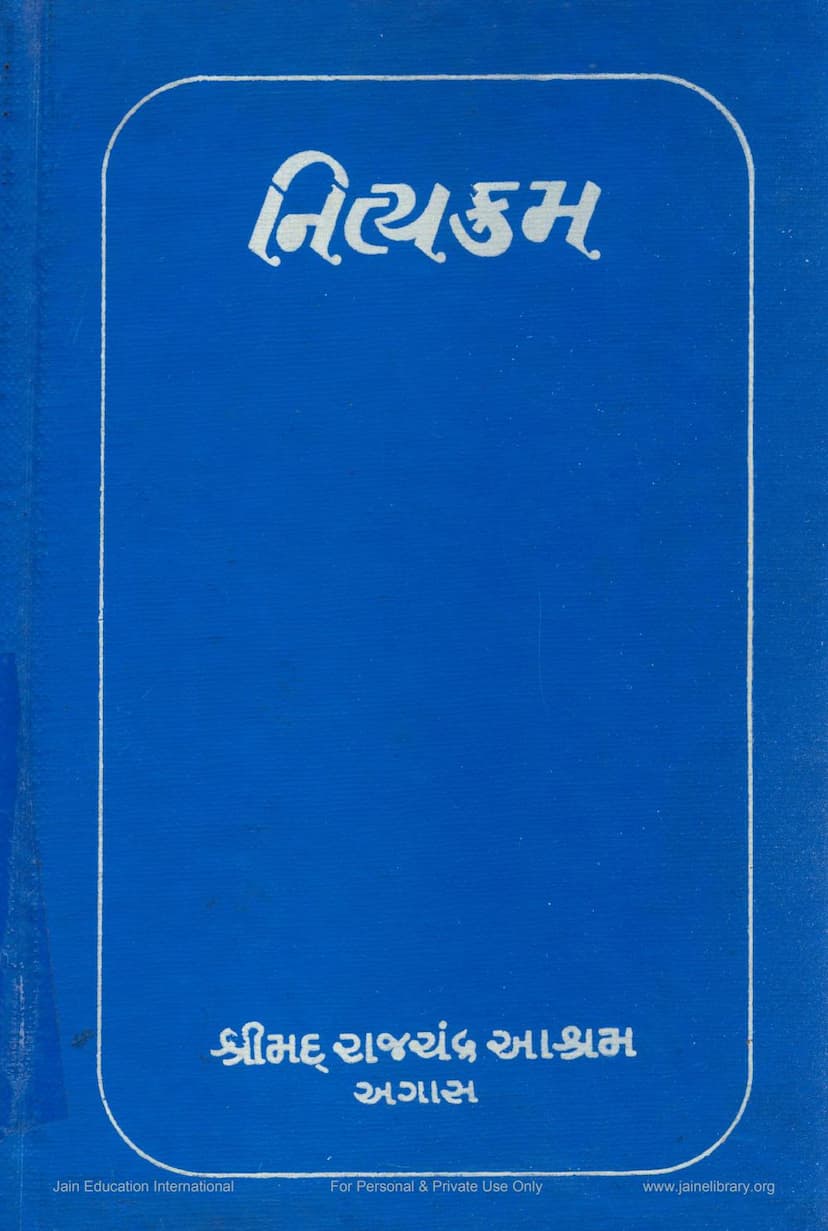Nityakram
Added to library: September 2, 2025

Summary
Here's a comprehensive summary of the Jain text "Nityakram," based on the provided PDF content:
Title: Nityakram (Daily Routine/Program) Author(s): Shrimad Rajchandra Ashram Agas Publisher: Shrimad Rajchandra Ashram Edition/Reprint Details: Eleventh Edition, 10,000 copies printed, Vikram Samvat 2049 (1993 CE).
Overall Purpose:
The book "Nityakram" is a compilation of daily devotional and spiritual practices followed at the Shrimad Rajchandra Ashram in Agas. It serves as a guide for "mumukshus" (those seeking liberation) to perform their daily spiritual regimen, bringing together various essential texts and prayers in a single, accessible volume. The publication aims to facilitate consistent spiritual practice and self-improvement.
Key Sections and Themes:
The "Nityakram" is structured as a detailed program, covering various aspects of Jain spiritual discipline throughout the day. The Table of Contents (Anukramanika) reveals a rich collection of prayers, verses, and philosophical discussions, including:
- Morning Devotional Practices: This forms a significant portion, starting with Mangalacharan (auspicious invocation) and Jineshvar ni Vani (Words of the Jinas). It includes songs and verses for morning contemplation (Pratahkal ni Bhavna na Pad), self-awareness (Atma Jagruti na Pad), and gratitude towards the Guru (Sadguru Bhakti Rahasya, Sadguru Upkar Mahima, Sadguru Stuti).
- Essential Jain Practices: The book details core practices like Alochna Path (confession and repentance), Samayik Path (meditation and equanimity, encompassing the six essential duties), and Kshamaapana (seeking forgiveness).
- Philosophical and Ethical Teachings: Sections like Atma Anubhav (experience of the self), Kevalya Beej shu? (Yama and Niyama, the foundational principles of Yoga), Brahmaacharya vishe Subhashit (aphorisms on celibacy), and the entirety of Shri Atmasiddhi Shastra (a key Jain philosophical text) are included, highlighting the intellectual and ethical depth of Jainism.
- Devotion and Praise: A substantial part of the book is dedicated to praising the Jinas and the Guru. This includes various Chovishi (praises of 24 Tirthankaras), Stavano (hymns of praise), Vandan (obeisances), and Pranipat Stuti (praises through prostration). The verses often express deep devotion, humility, and reliance on the Guru and Jinas for spiritual guidance.
- Daily Schedule Integration: The book outlines a structured daily routine, suggesting specific times for certain practices, such as morning devotional sessions (4 AM to 6:30 AM) and afternoon sessions (2 PM to 4 PM).
- Specific Prayers and Practices:
- Mangalacharan and Jineshvar ni Vani: Setting an auspicious tone and acknowledging the wisdom of the Tirthankaras.
- Pratahkal ni Bhavna na Pad: Morning thoughts and aspirations.
- Atma Jagruti na Pad: Verses to awaken self-awareness, often using analogies from nature.
- Swatmanuvrittant Kavya: A poetic account of self-realization.
- Jad ne Chaitanya: Distinguishing between the material (non-sentient) and the spiritual (sentient) realms.
- Shri Sadguru Bhakti Rahasya: Verses emphasizing the importance of devotion to the Guru.
- Alochna Path: A detailed path for confession and repentance.
- Samayik Path: Including the six essential duties (Aavashyak Karma), which are crucial for spiritual progress.
- Meri Bhavna: Personal aspirations and vows.
- Kaivalya Beej shu?: Focusing on foundational spiritual practices.
- Kshamaapana: Seeking forgiveness for transgressions.
- Chh Pad no Patra: A letter outlining six essential principles for spiritual progress.
- Vitrag no Kahelo: The teachings of the detached ones.
- Pratahkal ni Stuti: Morning praises.
- Chaitya Vandana Sutras: Rituals performed in temples.
- Stavano: Hymns of praise to various Tirthankaras and Gurus.
- Pachchakhan: Vows and resolutions.
Core Philosophical Underpinnings:
- The Role of the Guru: The text places immense importance on the Guru as the guide to true spiritual knowledge, capable of awakening consciousness and leading towards liberation.
- Self-Reliance and Discrimination: While acknowledging the Guru's grace, the verses also emphasize the importance of self-effort, discrimination between the self and the non-self (Jad ne Chaitanya), and adherence to righteous principles.
- Equanimity and Non-Attachment: Practices like Samayik and verses on detachment from worldly pleasures highlight the Jain emphasis on developing equanimity and reducing attachment (raag-dvesh).
- Repentance and Forgiveness: The detailed Alochna Path and Kshamaapana sections underscore the Jain principle of actively seeking to purify oneself from past actions.
- Spiritual Progress (Gun Sthanak): The inclusion of verses related to Gun Sthanak Arohan (stages of spiritual development) indicates a structured path towards liberation.
Historical and Contextual Notes:
- The mention of "Shrimad Rajchandra Ashram" suggests a connection to the lineage or teachings influenced by Shrimad Rajchandra, a prominent modern Jain spiritual leader.
- The preface highlights the book's popularity and the need for its frequent reprinting due to its utility for devotees.
- The first edition's note mentions a devotee, Dhiradbhai, whose desire to consolidate all daily prayers into one book and his financial contribution made this publication possible.
Overall Impression:
"Nityakram" is a devotional manual that provides a comprehensive framework for daily spiritual practice within the Jain tradition, particularly influenced by the teachings of Shrimad Rajchandra. It combines devotional hymns, philosophical insights, and practical guidance for seekers on the path to liberation. The book reflects a deep commitment to scriptural study, Guru devotion, and consistent spiritual discipline.